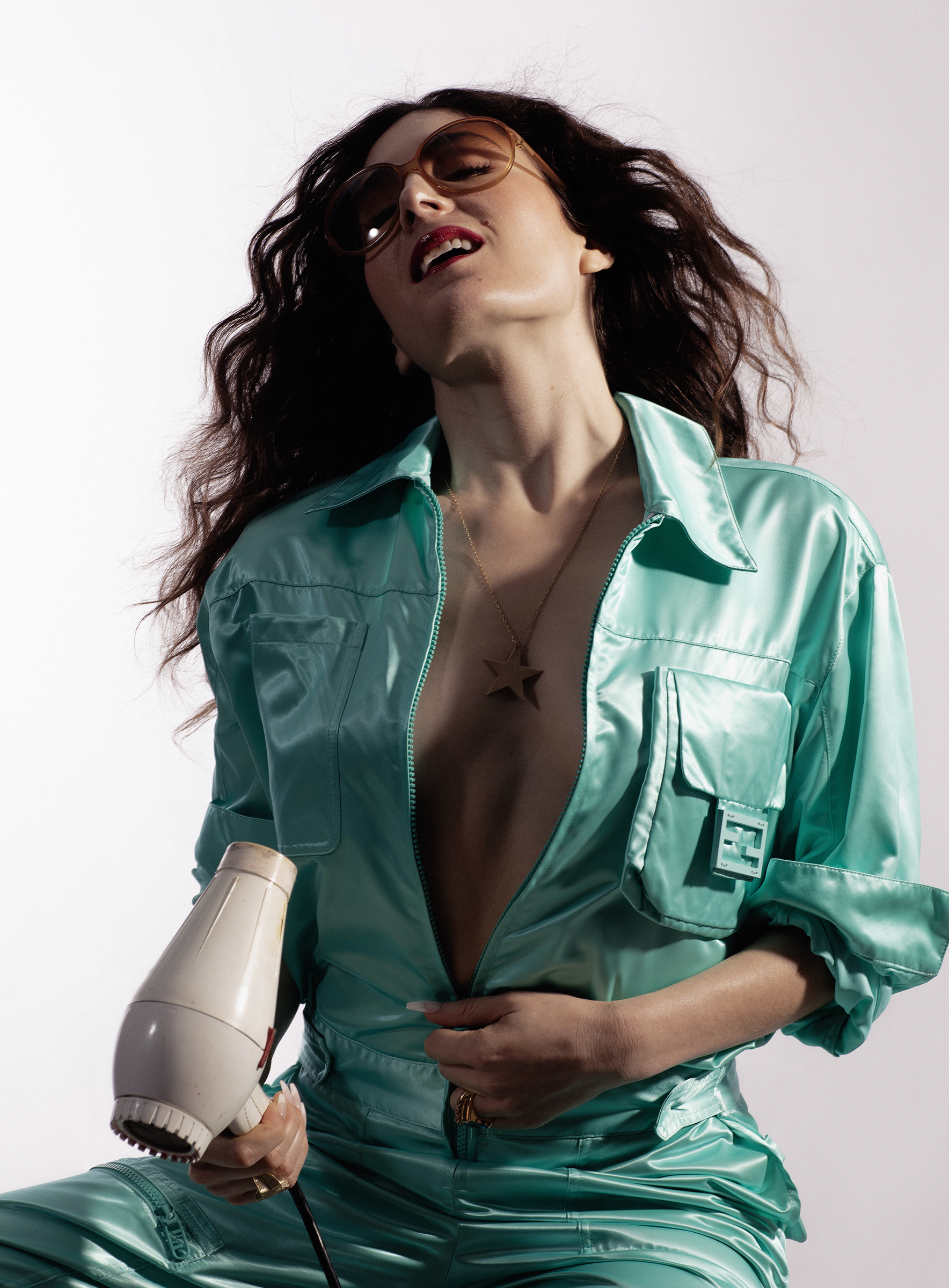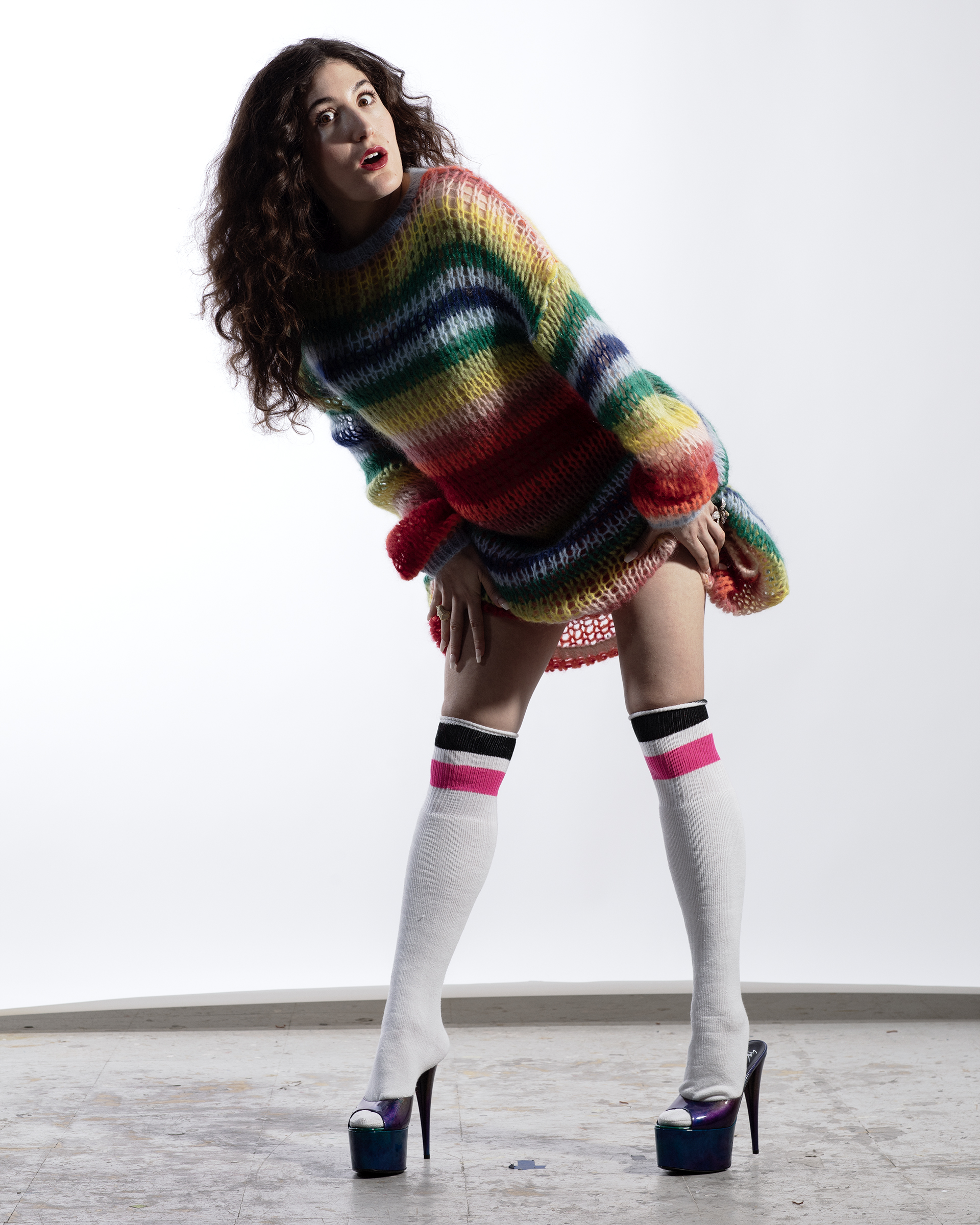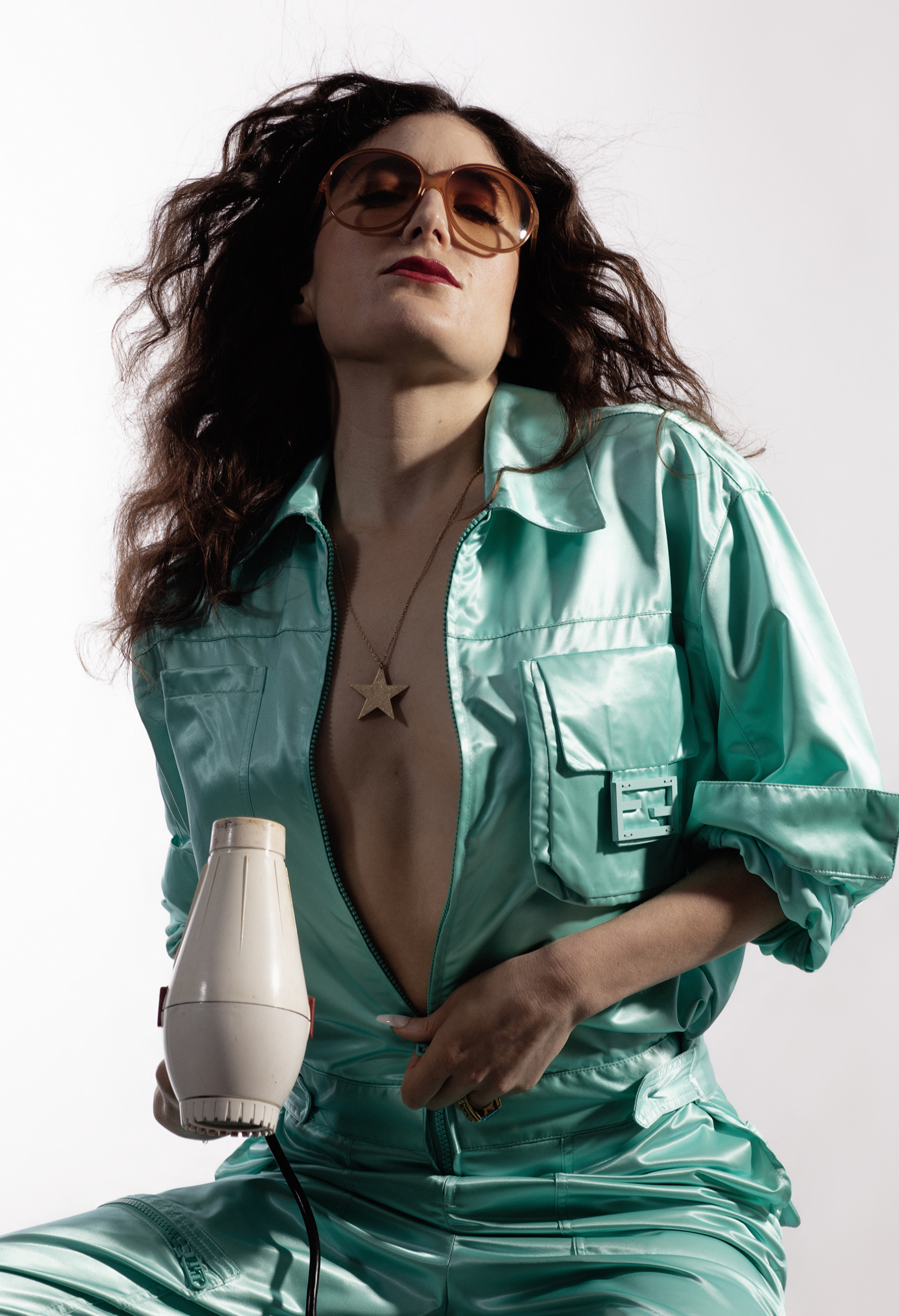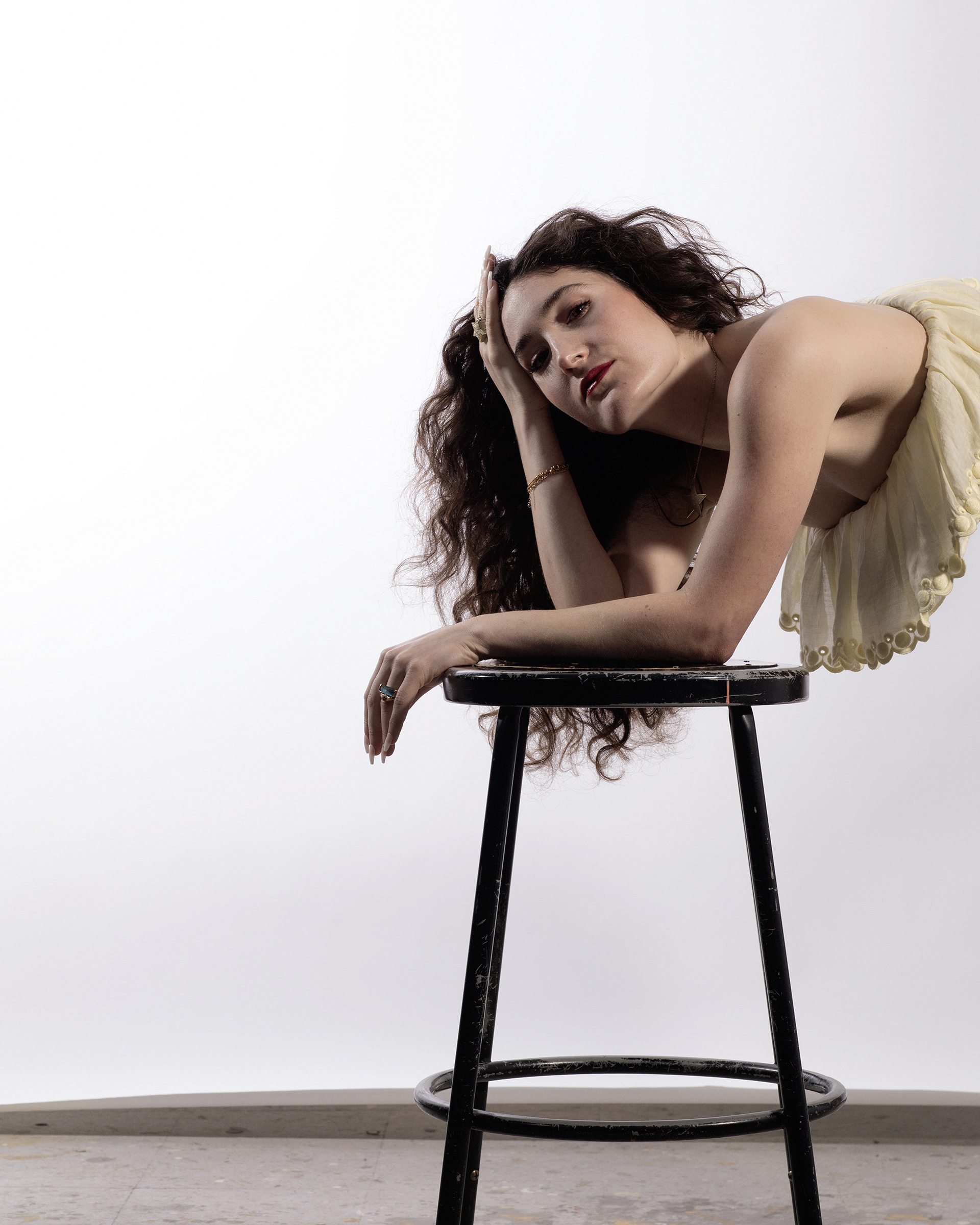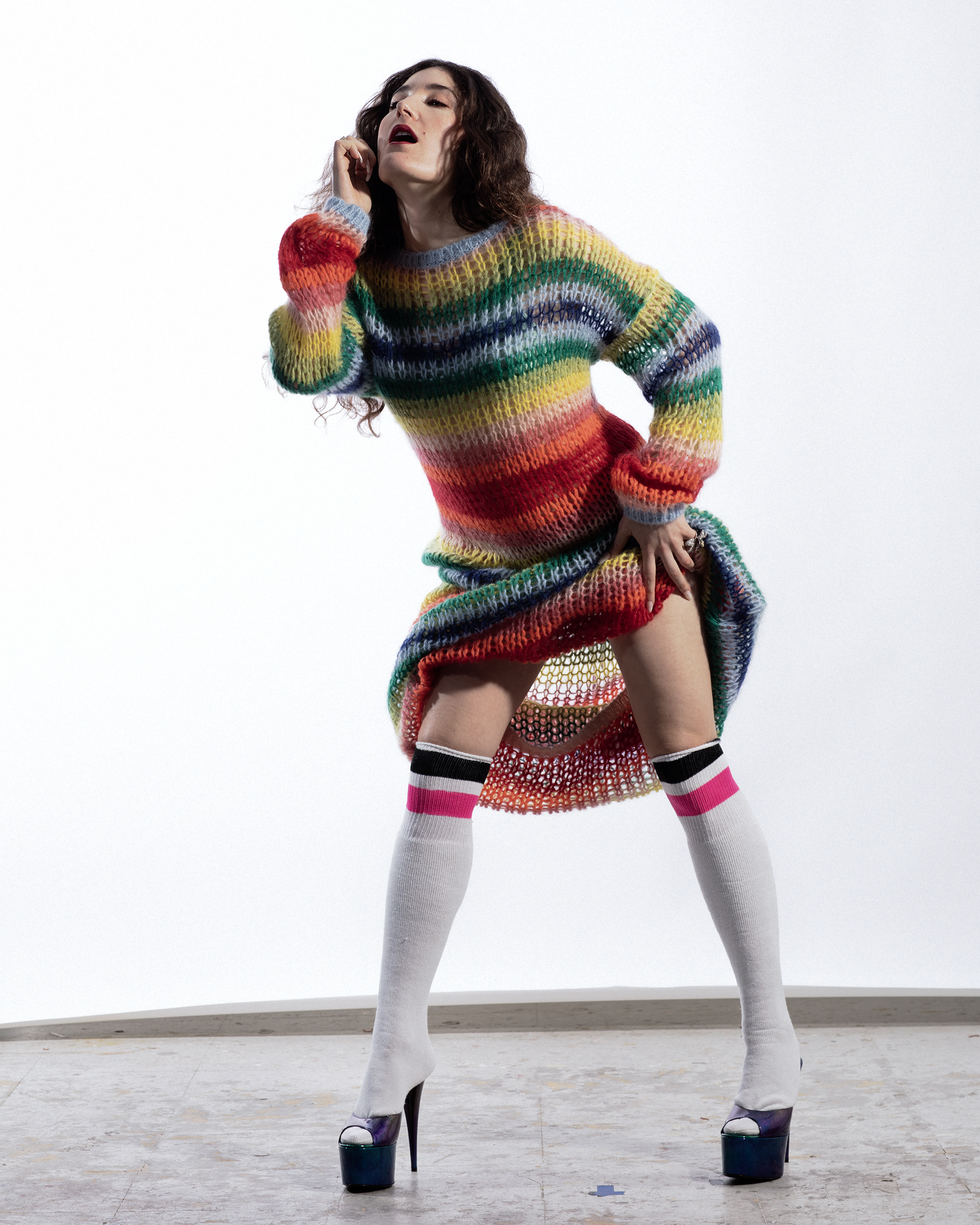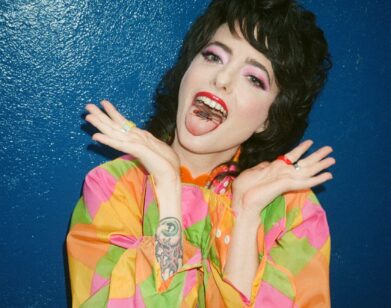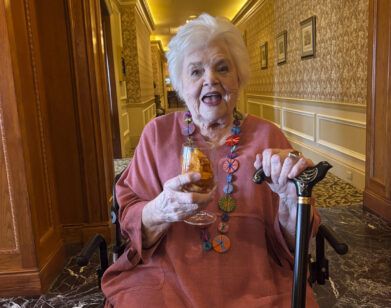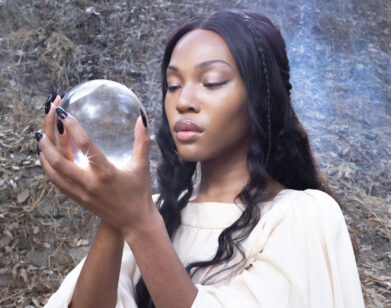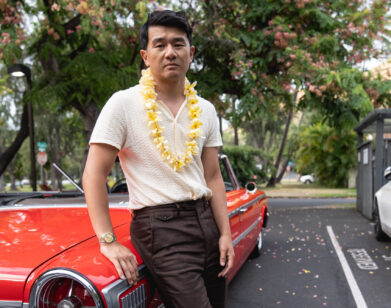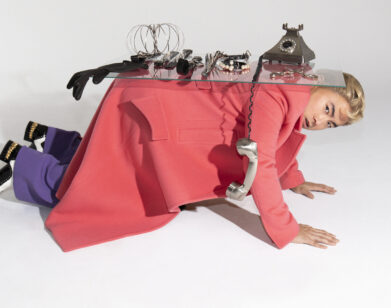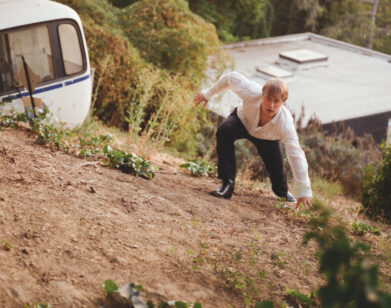IN CONVERSATION
Kate Berlant, in Conversation with Nathan Fielder
In Cinnamon in the Wind, Kate Berlant’s 2019 stand-up special, released this year after lingering in a kind of post-production purgatory, the 35-year-old comedian briefly dangles a carrot of autobiography to her audience. It’s a rare moment for a performer who has mostly eschewed the conventions of confessional stand-up comedy in favor of more brainy, high-flown hijinx. “One thing about me that is essential,” she begins, “is that I do comedy primarily to process the overwhelming privilege of my childhood… adolescence… and now adulthood.” Then, in Chaplinesque fashion, her knees buckle and her shoulders plunge, as if she were lugging a heavy crate. “Imagine almost collapsing under the weight of resources,” Berlant continues, now duck-walking across the stage, “just finding the strength to get to Zara.”
It’s a hilarious and singularly Berlantian moment, one in which she simultaneously yields to the pieties of contemporary stand-up—reveal funny stories about yourself, perhaps laced with pathos, irony, or regret—while subverting the notion that autobiography is a necessarily generative or rewarding approach to comedy whatsoever. Berlant, who Bo Burnham has called the “most influential/imitated comedian of a generation,” prefers to narrate the bare-naked hubris and humiliation of performance itself. Reveling in screwball flamboyance, lampooning the self-serious rhetoric of academia and identity politics, she frequently adopts the on-stage persona of an overeducated braggart convinced of her own genius. “It’s really hard to have absolutely no comedic influences whatsoever,” she says in Cinnamon, before admitting that she is, in fact, influenced by “small-batch granola” because its packaging “actively resists capitalism.” George Carlin, too, she finally concedes.
This month, Berlant is back at New York’s Connelly Theatre for the second run of her one-woman show Kate, a madcap send-up of Hollywood ambition and the cynical economy of personal trauma. In it, she plays an actress searching for a formative and sufficiently moving childhood wound so that she can finally cry on command. Over 90 minutes, in front of a giant screen projecting her uniquely pliant face in close-up, we watch her try, summoning her baggage—a discouraging mother; an iron deficiency—as Berlant wills herself into various states of affliction like an ink blot. Longtime followers of Berlant’s will recognize it as the high-water mark of her career-long fixation with the pretensions of performance. The comedian Nathan Fielder, himself a scholar of human behavior as it mutates and morphs on camera, called it “one of the funniest things I’ve seen live, ever.” So, days before the reopening of Kate, Fielder got on Zoom to interview Berlant about her show, quantum computers, sex, curly hair, and our collective obsession with sincerity.—JAKE NEVINS
———
KATE BERLANT: Hi, Nathan.
NATHAN FIELDER: Hi, Kate.
FIELDER: Can I grab a coffee quickly?
BERLANT: Take your time. I’ve got nowhere to be.
FIELDER: Is this ruining it?
BERLANT: No, it’s adding texture.
FIELDER: [Returns with coffee cup] Here’s the evidence. I got a coffee and didn’t do something else instead.
BERLANT: You went to do research about me?
FIELDER: Yeah. I forgot who you were. And so now I just saw your face, and then I was able to do a Google image search. And I quickly looked you up. And then the coffee was ready to go, so I had two minutes to be like, “Oh, okay. She’s a comedian.”
BERLANT: Yeah. “Went to NYU.”
FIELDER: NYU?
BERLANT: Not for acting. I was rejected from acting school.
FIELDER: Oh, why is that?
BERLANT: They didn’t like my Laramie Project monologue, apparently.
FIELDER: Laramie?
BERLANT: The Laramie Project.
FIELDER: Am I supposed to know what that is? You’re saying it like I’m stupid for not knowing.
BERLANT: It’s a play about the murder of Matthew Shepard, who was brutalized for being gay, in the town of Laramie, Wyoming. And it was made into a HBO film that I was obsessed with in high school. I say HBO, I don’t know why, but just so you know the quality was really there.
FIELDER: You’re dropping a lot of things. NYU, HBO. I feel like that’s kind of your thing.
BERLANT: Well, I was taken with The Laramie Project. I went to an all-girls school and tried to get them to mount The Laramie Project and there wasn’t enough interest.
FIELDER: You’re saying it wasn’t of interest because it was like, a boys play?
BERLANT: No, I think people—
FIELDER: People were like, “Why can’t we just do Aladdin?”
BERLANT: Yeah. They wanted to do something a little more funky and a little more carefree, not something so brutal. But I was obsessed with great male actors, as I have tended to be, and I did the monologue that Ben Foster did in the movie as my audition for acting school and was rejected across the board.
FIELDER: Oh my god. Why?
BERLANT: I mean, I’ll never know.
FIELDER: Why do you think?
BERLANT: I think I was bad.
FIELDER: I’m guessing it was very dramatic. I sometimes have gaps with American history, because we weren’t taught that in Canada. But there’s also gaps in my knowledge because I’m actually a dumb person. So it’s one of those two. That I’m dumb, or that I’m Canadian.
BERLANT: I’m American and have huge gaps in a lot of popular American culture, which has gotten me into trouble when I’ve pretended to know something that someone’s referencing because I want them to like me. And then I get into a situation where I’m unable to actually have a realistic conversation about the topic.
FIELDER: So you’ll pretend to know something so you don’t seem dumb?
BERLANT: I think I’ve stopped doing it. Instead I just say, “I don’t understand what you’re talking about.”
FIELDER: When you said the play, I could have been like, “Oh, yeah.” I have tended to do that. I used to be one of those people, when people would be like, “Oh, I’m into this band,” I’d be like, “Yeah, yeah, me too.” And then at one point a friend said to me, “You know, you can say you don’t know the band.” Because it was so obvious I didn’t, and I was so humiliated. So I just started telling people, “I don’t know anything about music.” Anyway, not to steal your thunder with that great anecdote.
BERLANT: No, it’s true. Music taste in youth is such a terrifying barometer of your social worth.
FIELDER: The good thing now is, music is so uncool that no one cares anymore.
BERLANT: [Laughs].
FIELDER: So, I notice you’ve framed your Zoom camera prominently featuring a piece of art. Did you want to talk about that?
BERLANT: Yeah, I’m sitting on the hotel bed. And this is—it looks like a fake Franz Kline or something, right? Isn’t that the name of that guy?
FIELDER: Oh, yeah. Franz Kline.
BERLANT: The room’s tiny but it’s well-appointed.
FIELDER: And of course, you’re in New York. You don’t live there?
BERLANT: I don’t. I lived in New York for about eight years, but I’m here just to do my show.
FIELDER: I’ve said this to you privately, but I came to see it a couple months ago and I was so blown away by this show. I thought it was one of the funniest things I’ve ever seen live.
BERLANT: I can’t believe… Thank you. I told you in private, and I’ll say it now on the record, that your reaction was one of the most meaningful reactions I received because I think you’re one of the most exciting people working today.
FIELDER: That’s nice of you to say. Now, my ticket was free. Are the tickets free for everyone?
BERLANT: No, just for people who I think are the most exciting people working today.
FIELDER: So other people actually have to pay?
BERLANT: Yeah.
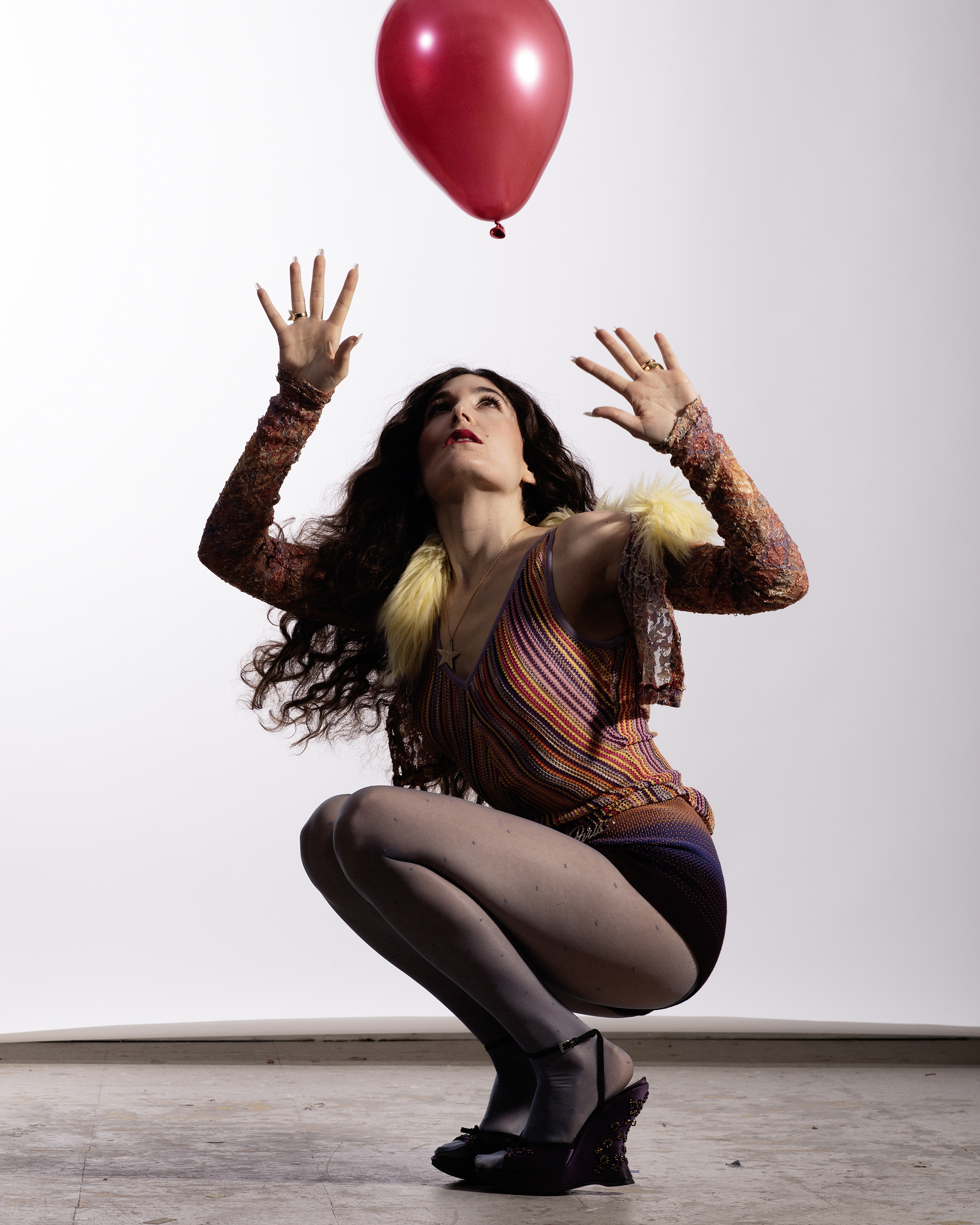
Sweater by XULY.Bët. Vintage Shirt by Missoni. Vintage Shorts by Missoni. Tights by Falke. Vintage Shoes by Prada.
FIELDER: Well, I definitely think it’s worth whatever you’re charging. So I want to find out, what’s the genesis of this show? You brought up that you started out doing dramatic acting. And this show is very funny and really original.
BERLANT: Well, I came into comedy first. I started stand-up when I was 17. And before that, I would do school plays and I was always drawn to the funny role. I was the class clown. But the dramatic stuff, that’s my desire to be taken seriously as an actor, or a performer.
FIELDER: But also, this is sort of what the show is about, your relationship to acting. I don’t want to spoil the show, because it’s really an experience, and I went in knowing nothing, but I remember there being a moment where, the way you set it up, I was like, “How is she going to pay this off?” And then you blew it away in a way I didn’t see coming.
BERLANT: Oh my god.
FIELDER: So let’s talk about this show.
BERLANT: I hadn’t done any performance at all throughout the pandemic, and last December I was like, “Okay, I need to perform again.” I did stand-up for the first time, just an hour, just to kind of feel what that felt like. I taped a special for FX in 2019 that wasn’t released for three years. And I had this strange feeling of performing and feeling like, not that standup wasn’t interesting to me, but that I had to do something else, because there was no closure with that special, in a sense.
FIELDER: Why wasn’t it released?
BERLANT: It continues to be a mystery that the suits at FX shelved it.
FIELDER: Oh, it’s still not out?
BERLANT: It’s out now. It came out in September on Hulu. It’s called Cinnamon in the Wind. But creatively it felt weird to have worked on that, and then no one saw it. My stand-up, although of course there are things I write and repeat, is based a lot on improvising, and I had the urge to not improvise. Sometimes doing longer shows, I’d be really overwhelmed with anxiety, and I would think, “Wouldn’t it be kind of great to know what’s going to happen a little bit more?” And so Bo [Burnham], who directed my stand-up special, who’s a friend of mine, came to the show and sort of asked me, “What would it look like if you actually wrote a show?” I started to really think about that. With my comedy, I’ve never been someone that sits down at a desk and writes. So it was a totally different process. It really was, I guess, an almost nine-month workshop process, just forcing myself to get on stage as much as possible and then to write at home.
FIELDER: What’s your and Bo’s working dynamic like?
BERLANT: I trust him so much and I really feel seen by him. I don’t feel like I’m ever having to convince him or prove my point to him. We all kind of hope for someone who actually sees you and is able to talk about what you do with a certain clarity that you just can’t afford yourself. So that’s been huge for me, and this show just kind of started to emerge. I don’t think this is giving anything away, but I was experimenting with having a camera on stage and sort of filming myself.
FIELDER: Yeah, I just want people to go, but the way you’re doing stuff with performance, and how it’s different on camera versus not.
BERLANT: Thank you. The show is absolutely about acting, or about trying to be seen, or seeking attention, or wanting to frame oneself, wanting to inhabit a narrative. Your work also deals with these themes of the fiction of persona.
FIELDER: One thing I’ve been reading about lately is quantum computers. I guess it’s something that they’re trying to invent. I’m going to sound really dumb describing it, but it’s basically a computer that’s really good, I guess? It’s going to be way better than any computer. So they say they’re five to 10 years away from inventing one. But when they do, everything that’s private about all of us will be public.
BERLANT: Five to 10 years, that’s nothing.
FIELDER: I’m probably not getting this exactly right, but that’s sort of my understanding of what this is.
BERLANT: Of course we’re a moment away from any perceived security being just eviscerated. That makes total sense.
FIELDER: What do you think that’ll do?
BERLANT: Maybe [it’ll be] a huge relief. Maybe our constructions of self will finally just be dead, and we’ll just be forced to… No, it’s probably bad. But I don’t know.
FIELDER: I guess streaming will work faster too, and stuff.
BERLANT: Oh, good.
FIELDER: Hey, how often do you cut your hair?
BERLANT: Twice a year.
FIELDER: Twice a year? And how many inches do they cut off each time?
BERLANT: I always like to keep my hair long. So usually a maximum of two inches will go.
FIELDER: So it only grows two inches every six months?
BERLANT: That’s interesting. I wish I knew. I’m never getting more than two inches off, that’s for sure. And sometimes it’s even less.
FIELDER: And the curls, would you describe it as “curls” or “waviness?”
BERLANT: I would describe these as curls.
FIELDER: And that’s always been there?
BERLANT: Since the day I was born.
FIELDER: That’s really exciting.
BERLANT: I never fought it. I’ve never straightened my hair recreationally.
FIELDER: I’m thinking it would be distracting, getting in my face, touching my nose all the time and tickling me. Do you not even notice it when it touches your nose?
BERLANT: Probably, having this hair on my head my whole life has affected me in ways that I’ll never have access to. I will say, I never ever put my hair up. A couple times I’ve experimented. When I have my hair in a ponytail, suddenly I can hear everything. I feel almost like a different person.
FIELDER: You’re so used to the hair getting in your face that it’s actually weird when it doesn’t happen?
BERLANT: When it’s gone, something does morph about me. Every year I’ve been like, “I’m going to start putting my hair up more.” Since I was young, I’ve always been fascinated by watching women put their hair in a ponytail.
FIELDER: So when you look at other women putting their hair up midday—
BERLANT: Shocking to me.
FIELDER: Why haven’t you been like, “Well, that’s easy. I can do that too”?
BERLANT: It is genuinely a block, almost like the block I’ve had around writing my whole life.
FIELDER: You’re not trying to transition away from hair, are you? By bringing up writing?
BERLANT: No, I wouldn’t think of it.
FIELDER: Oh, okay. Just want to make sure.
BERLANT: I put my hair in a half-up thing for a friend’s wedding recently, or it was the rehearsal dinner, and I thought people were going to have a bigger reaction. No one really commented on it, which I found really disturbing, which I interpreted as everyone thinking it was really bad and that I should never do it again.
FIELDER: But how do you know everyone at this wedding wasn’t thinking about their own hairstyle?
BERLANT: Completely fair. And I guess that just shows we really all live in these privately defined worlds, and we’re not as alone as we think.
FIELDER: Wow. And to think that conclusion came from just a discussion about hair over the course of 10 minutes. To get there was kind of incredible.
BERLANT: Thank you for bringing it up. Because it’s something that I think a lot of journalists shy away from.
FIELDER: I do think, these days, if you’re a male interviewing a woman, asking her about parts of her body is risky.
BERLANT: Well, by the way, there it is. The show Kate has essentially been, “No one wants to talk about me as a physical being on the stage.” As a culture now, we’re absolutely terrified of sex. I think to even describe my hair for some would be taboo in the current culture.
FIELDER: So you wish more people talked about you in a sexual way when you were on stage?
BERLANT: No one wants to talk about it. There’s parts in the show, too, where I’m kind of overly sexed. Or it’s like, “This person’s putting on a show because they want to get work, they want to appear attractive, they want to be on stage.”
FIELDER: As a performer myself, I can say that my number one goal whenever I’m performing is to get sex.
BERLANT: To be perceived as hot, yeah.
FIELDER: But do you feel like that?
BERLANT: Okay, so the person that I’m playing on stage absolutely is aware of wanting to be attractive.
FIELDER: Yes.
BERLANT: And I, Kate Berlant, am of course aware of my own desire to appear attractive to people.
FIELDER: Do you feel like you want to appear attractive through the grotesqueness of the character, or the performance?
BERLANT: Wait. I want to understand exactly what you mean. You mean appear attractive through—
FIELDER: Okay. Here’s a way of framing it, maybe. If a journalist were to take a big swing and write something about you, your physical body on stage, your sexuality, what—
BERLANT: Would I want them to say?
FIELDER: Yeah.
BERLANT: There are things in the show in which I make myself kind of grotesque, or hyper-desexualized. But those are inevitably in service of this person who is an actress on stage, trying to get work, trying to be seen as talented, trying to hopefully make it in the movies. I think this show—both in the text of the show, but also in the subtext—is so overtly trying to get attention and overtly trying to be perceived as hot that it’d be nice if someone would just hand it to me and say, “She’s hot.”
FIELDER: Just something like, “Kate Berlant’s show wows. Greatly conceived, but I was so distracted by her body and how hot she was that I couldn’t really focus on the show.” That would be the ideal headline?
BERLANT: I would love it.
FIELDER: People are shying away from that.
BERLANT: I was very honored to receive some great critical attention for the show. And I was alarmed by the lack of references to my physical body on stage, and the sexiness of the show.
FIELDER: Let’s say you looked out into the audience and someone was jacking off. Would you like that? Or would you be like, “That’s too far ”?
BERLANT: I don’t know. I guess I’d have to see what happens.
FIELDER: It is New York.
BERLANT: The show would have to continue. I would have to really hold it together and stay true to the job. I think if performance, in all forms, doesn’t reach you on a physical, visceral level, then what the hell are we doing?
FIELDER: Wow, that’s beautiful. Well let me say, Kate, when I was watching the show, I found you gorgeous and really sexy.
BERLANT: Thank you.
FIELDER: But not in a way that distracted from your talent.
BERLANT: Thank you.
FIELDER: So it was a perfect balance for me.
BERLANT: That’s the holistic view of the show and of myself that I’m striving for, that people are too cowardly to verbalize.
FIELDER: I guess you’re talking about an omission that is frustrating. But has anyone said anything about the show that bugged you?
BERLANT: This isn’t giving anything away, but there’s something early on in the show that teases some kind of secret, some kind of confessional, which is a trope, sort of, of the one-woman show. This idea of a confession, or a secret, or something that’s going to be revealed, or something that’s inherently autobiographical. So there’s this secret. And the show’s very vulnerable for me, and I think that, in many ways, it reveals a lot about myself. Sometimes I’m surprised by, or just really interested in, any kind of reaction that gestures towards some kind of disappointment that I didn’t really reveal myself. Or that Kate Berlant didn’t really go there.
FIELDER: And that’s the thing. Just because you’re not saying everything literally and explaining it, it doesn’t mean the performance isn’t communicating deep insecurities and deep vulnerabilities. It’s interesting that people have a certain idea of what sincerity is sometimes.
BERLANT: I think that’s also because I am a stand-up, this obsession with the truth, and this obsession with authenticity or sincerity. This idea of a self at all, that is totally devoid of fiction, or is not a fabrication. Especially when someone’s on stage, or if someone has a camera on them. And this obsession with truth feels more and more like a total fallacy, particularly in our current world, and beside the point entirely.
FIELDER: Right. Maybe it’s also wanting to be explained the thing, as opposed to making an effort to understand you and your way of communicating. I do find that there is that tendency sometimes when people are like, “I want to be told the point.” As opposed to trying to understand it or trying to figure it out. I sort of lost my train of thought. But it’s like, most things aren’t always clear. And in general it feels like, to navigate through anything in the world, you have to decipher all these codes.
BERLANT: Absolutely. And also, now, we’re all actors. Everyone has a phone and is used to being imaged.
FIELDER: Yeah. Like, If someone gave this sincere performance in jeans and t-shirt, it’s not like you trust [them]. [Even] that is so calculated.
BERLANT: Yeah. “Look how stripped down and raw.” It’s so funny. We know what it’s like to construct a self in a performance, just existing walking down the street. So this idea that anyone is going to be on stage and not be an actor, or a performer, that performance is not a construction at all, it’s so bizarre.
FIELDER: Yeah. That stuff’s really heady. Pretty intellectual.
BERLANT: I’ve always resented when people equate artifice with somehow avoiding authenticity. I remember there was a moment where John [Early] and I were at a party and John did this big laugh. And the person was like, “You don’t have to fake-laugh.” And I kind of put my arm out in front of him. I was like, “It’s not fake!” And it actually felt like a loaded moment. Because I know John and I both have had that throughout our lives, where being hyper-animated, or being big, is somehow perceived as putting on a show. “That’s a performance, that’s not really them.” Whereas I’m like, “How dare you?” Like, me crossing my eyes, that is absolutely me.
FIELDER: It’s funny, I have basically the opposite my whole life. Where I’ll be perfectly content doing something, and people will be like, “What’s wrong? Is everything okay?” And I’m totally just fine. Normal, in a good mood. And then I’m like, “I guess something about my face just makes people think I’m upset or sad all the time.” But then I wonder if people project that around me, and then I take on the energy of like, “Oh, I guess I am a loser?”
BERLANT: Well, we rehearse who we are every day, and it does become who we are, ultimately. All right. Now that just sounded…
FIELDER: No, that was beautiful.
BERLANT: But it wasn’t anything.
FIELDER: That was a great conclusion. And Kate, you’re so fucking hot.
BERLANT: [Laughs] I had a great time. I really needed the laugh. You have no idea.
———
Photographed by: Tina Tyrell
Styled by: Daniel Gaines
Hair Stylist: Julia Mannino
Makeup Artist: Ayaka Nihei using Surratt Beauty
Manicurist: Nori Yamanaka
Photo Assistant: Wes Knoll
Fashion Assistant: Angelica Asimakopoulos
Prop Stylist: Taylor Robinson

